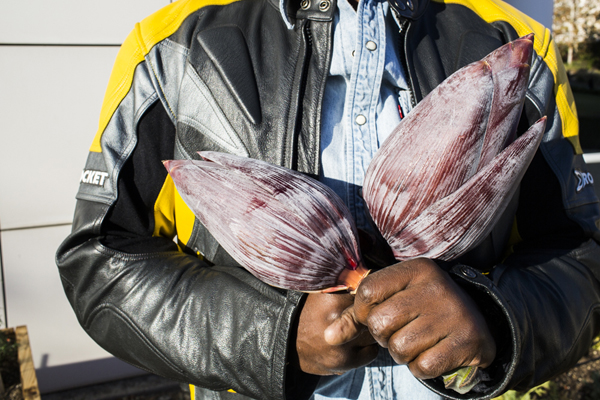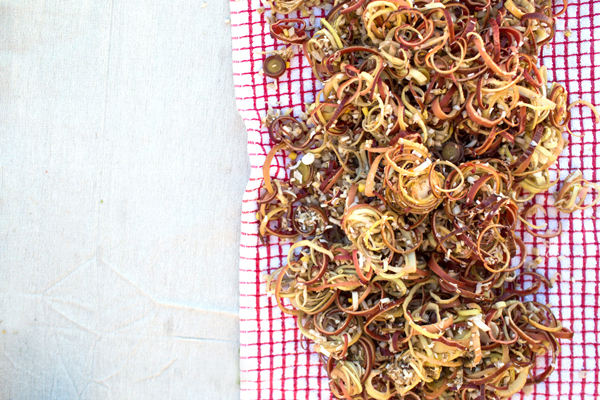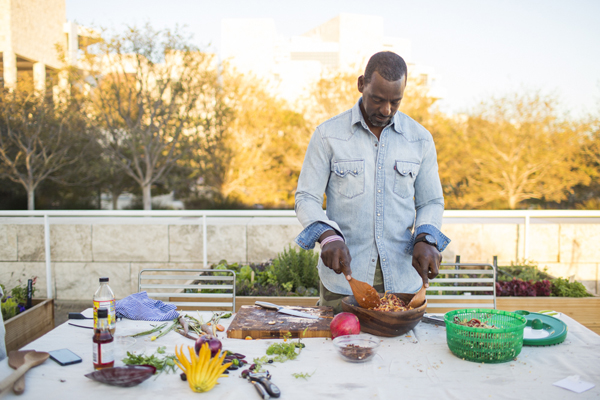Ron Finley is a gardener, artist, advocate, public figure, and neighbor, but more than anything, he is a force to be reckoned with. Located in South Central Los Angeles with a former life as a successful fashion designer, Ron wasn’t the obvious candidate to become the voice of urban farming, healthy eating, and hands-on food education that he is today.
![]() It all began with a modest garden Ron planted outside his home in a public median. Unbeknownst to him, the city of Los Angeles owns these so-called parkways, which are really just patches of dirt on the side of the curb. As a result, Ron was cited for gardening without a permit, an infraction that he never could have imagined. He started a petition, awakening his neighbors to the hypocrisy of a system that does nothing to help the conditions of what he calls a “food prison” but bars individuals from taking matters into their own hands. Eventually, the city let him continue; little did the city know, it had spawned a movement.
It all began with a modest garden Ron planted outside his home in a public median. Unbeknownst to him, the city of Los Angeles owns these so-called parkways, which are really just patches of dirt on the side of the curb. As a result, Ron was cited for gardening without a permit, an infraction that he never could have imagined. He started a petition, awakening his neighbors to the hypocrisy of a system that does nothing to help the conditions of what he calls a “food prison” but bars individuals from taking matters into their own hands. Eventually, the city let him continue; little did the city know, it had spawned a movement.
Only someone with Ron’s confidence and unbridled energy could dub himself “The Gangsta Gardener,” drive around town on a three-wheeled motorcycle, and still speak about the art and politics of growing your own vegetables. His TED talk has 2.5 million views, and his voice has inspired a generation of people to transform food deserts into community hubs, where anyone and everyone has the right to, as is scrawled on the steps outside his home, “plant some shit.” Ron frees organic gardening from any twee associations and reminds us that self-sufficiency and ownership over your own body and destiny is punk as hell. To put it simply, I love this guy.
Where I hesitate to call my garden practice my “art form,” Ron has no qualms about it. He believes in the power of urban farming to heal, awaken the senses, and expand your mind.
Read Ron’s recipe for banana-blossom salad »
Julia Sherman: Are you an accidental activist? Did you have any idea the garden outside your house would cause such an uproar?
Ron Finley: No, I am not an accidental activist. I have been an activist all my life—I just didn’t know it. I had no idea that this garden outside my house would create such a movement and be the inspiration that it has. It is amazing to me that my garden has inspired people around the world to not only talk about their health, their food, and their communities but engage in those things as well. All of that came from planting food.
Julia: Why do you think your garden was so controversial?
Ron: Because it goes against the status quo. Feeding yourself has become a foreign concept. Especially in these so-called underserved areas that have been designed to be unhealthy. The proliferation of drug and liquor stores is by design, and I think it’s up to us to change the design.
Julia: Can you tell me a bit about your fashion line? Are you still designing or has The Ron Finley Project taken over your time?
Ron: I’m still a designer, although I have not been actively designing fashion. The garden is just another outlet for creative expression. At one point, I am going to get back to fashion, but the garden has in fact encompassed most of my life and that is definitely for the good.
Julia: You and I have very similar gardening styles—kind of messy, a bit rogue. Do you have any desire to become more “professional” when it comes to technique? Or is the improvisational aspect of the garden important to you?
Ron: I am a motherfuckin’ professional! But I have no desire to change because that wouldn’t be me. My whole message is about designing your own life. Not the life that somebody else has designed for you or living the life that somebody else wants you to live. I try to replicate Mother Nature, and a lot of the things that I do are based off the idea of biomimicry.
Julia: Do you consider yourself an artist? Does that even matter?
Ron: Undoubtedly! We are all artists. Gardening to me is an art form, a means of self-expression, and a healing place. I tell people all the time, you don’t need meds, you need a garden.
The garden itself is a creative practice—it’s an incubator, my inspiration, my solace, sometimes my refuge. It’s my go-to place. It’s one big experiment. One big cultural shifter.
Julia: What do you cook from your garden?
Ron: I suggest people only grow what they like because otherwise you won’t eat it. I grow everything from apples, to brussels sprouts, carrots, Chinese purple mustard greens, pomegranate, bananas. There’s a pomegranate-cranberry dressing recipe that I like to use my pomegranates for. It all depends on the season. That’s what’s beautiful about the garden—it’s ever changing.
Julia: What is the biggest misconception that people have about you?
Ron: That I’m white, ha!
But seriously, the biggest misconception that people have of me is that all I do is grow food. People think I’m just one thing, some one-dimensional being. All they see is a guy that grows food. It’s bigger than food.
Julia: Tell me about Ron Finley HQ. What is the vision behind it?
Ron: The vision behind HQ is to change culture from the soil up. To bring back stewardship for this planet; we have to re-engage culture to show everyone that they are an artist. To have people build communities. Help people realize that their health is their own responsibility and that they can change their lives with food. Change your food, change your life. Heal your mother, heal yourself.
I want HQ to be a catalyst. I want it to be the epicenter for this global change.
Text of this post © J. Paul Getty Trust. All rights reserved.
________
About the Getty Salad Garden
The Getty Salad Garden is an installation of sustainably grown heirloom vegetables and salad greens, as well as a platform for engaging Los Angeles’ contemporary artistic community in a series of evolving conversations, programs and gatherings. Presented by artist and writer Julia Sherman, creator of the blog Salad For President, the Getty Salad Garden aims to synthesize a wide variety of creative voices as the fascinating history of art and food are explored in two exhibitions: The Edible Monument: The Art of Food for Festivals, and Eat, Drink, and Be Merry: Food in the Middle Ages and Renaissance.
The Getty Salad Garden is a project of the J. Paul Getty Museum Education Department and is made possible by the generosity of Anawalt Lumber, Bragg Live Food Products and Kellogg Garden Products.








Comments on this post are now closed.